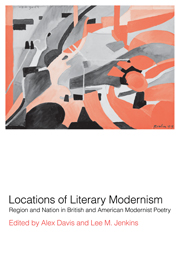Book contents
- Frontmatter
- Contents
- Notes on contributors
- Preface
- INTRODUCTION
- PART ONE OBSTINATE ISLES: THE ANGLO-CELTIC ARCHIPELAGO
- PART TWO AN AMERICAN PLACE
- 7 Pound's places
- 8 Wallace Stevens and America
- 9 Locating the lyric: Marianne Moore, Elizabeth Bishop and the Second World War
- 10 ‘In the published city’: the New York School of Poets
- 11 Modernism deferred: Langston Hughes, Harlem and jazz montage
- Notes
- Index
7 - Pound's places
Published online by Cambridge University Press: 06 July 2010
- Frontmatter
- Contents
- Notes on contributors
- Preface
- INTRODUCTION
- PART ONE OBSTINATE ISLES: THE ANGLO-CELTIC ARCHIPELAGO
- PART TWO AN AMERICAN PLACE
- 7 Pound's places
- 8 Wallace Stevens and America
- 9 Locating the lyric: Marianne Moore, Elizabeth Bishop and the Second World War
- 10 ‘In the published city’: the New York School of Poets
- 11 Modernism deferred: Langston Hughes, Harlem and jazz montage
- Notes
- Index
Summary
In summer 1912, Pound undertook two walking trips in the South of France. The first, taking in such important troubadour sites as Hautefort and Excideuil, was brought to a halt after two weeks when news reached him in Limoges of Margaret Cravens' suicide. The young woman had been the poet's benefactor, and there were hints too of an attachment from which Pound may have withdrawn. Whatever the facts of the matter, the tragedy made a strong mark on Pound. After spending a desultory June in Paris, he set off once again and in the next three weeks travelled some thousand kilometres of the Midi, half of them on foot. The notebook recording his impressions was intended to provide material for a volume to be called Gironde, though dissatisfaction with his prose style and the diversion of energies into other projects left the work unfinished.
The manuscript of Gironde has disappeared, but what remains is the series of small notebooks in which Pound recorded his impressions of die troubadour landscape. These have now been edited by Richard Sieburth and provide a fascinating insight into Pound's thinking at this time. One of the aims of the trip was to test his theory that an allegory of military strategy was encoded in Bertran de Born's ‘Dompna pois de me no'us chal’, in which the reference to idealised ladies in various castles might suggest a hidden map of Bertran's political designs.
- Type
- Chapter
- Information
- Locations of Literary ModernismRegion and Nation in British and American Modernist Poetry, pp. 159 - 177Publisher: Cambridge University PressPrint publication year: 2000



